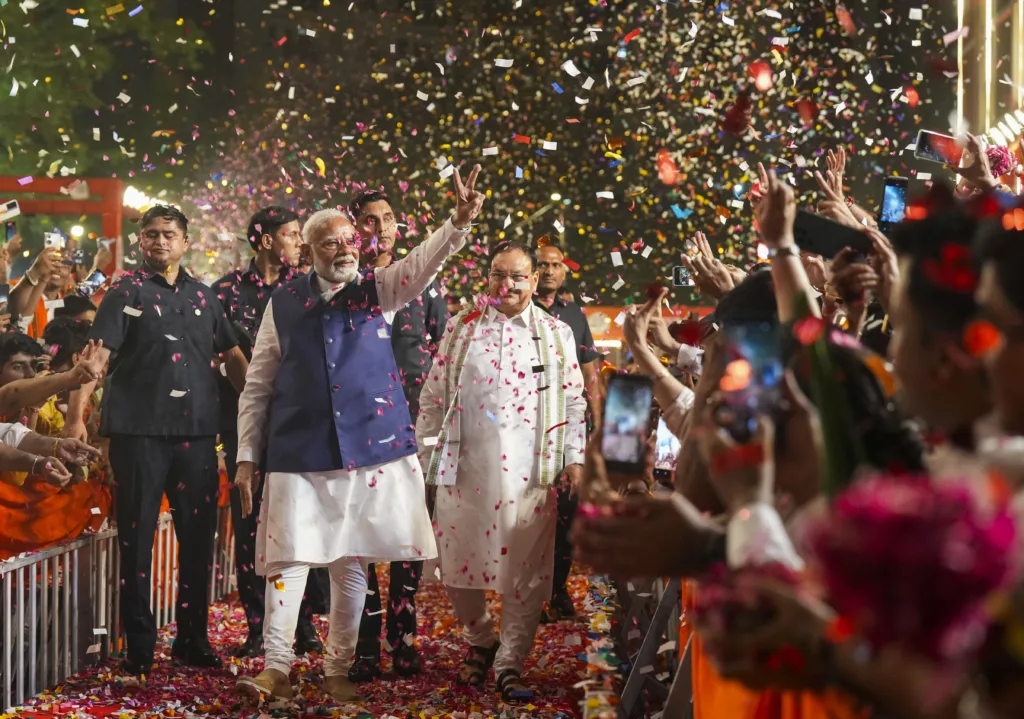It is a fascinating election result. One cannot pinpoint a single instance when both sides could celebrate wins. The Bharatiya Janata Party (BJP) has fallen well short of a majority on its own. But its pre-poll coalition, driven by the “phir Modi Sarkar” narrative, is comfortably past the 272-mark.
The opposition, clobbered over the last decade, has a verdict that genuinely puts it back in the game. It is a big personal win for the Gandhis in Amethi and Raebareli. The Congress is about 140 seats behind the BJP, but the results mean that Rahul Gandhi is not quite the pushover the BJP had declared him to be.
The BJP has already declared victory and is not flinching at the results. For the party, the Modi juggernaut continues. There is a jolt, but outwardly, the party is celebrating Modi 3.0.
A Complex Challenge
Being the categorical single largest party by a mile and a half, the BJP will obviously have more control over a coalition, to offer a stable government. But Narendra Modi’s ability to run a coalition will be tested. Especially with the likes of Nitish Kumar and N. Chandrababu Naidu, both mercurial politicians, and veterans of coalition politics.
Some INDIA allies are pushing to reach out to Nitish Kumar and Naidu to see whether the opposition can cobble up numbers. It seems unlikely and difficult. While being the single largest party by a long shot, the BJP certainly can claim the moral right to form a government. Coalition politics is a tricky and treacherous road.
The BJP may not be able to railroad legislation so much and will need to revisit the style of the Vajpayee-era coalition. Numbers alone are not the worry. The way the BJP has decimated regional forces over the last 10 years and the allegations of using agencies and institutions to curb dissent have made its allies wary.
Vajpayee-Era Troubleshooters No Longer Around
The BJP will have to let the moderates, within and outside, have their victory and the moderates will have to brace for Modi 3.0. This Modi-Moderate equation is a very important aspect that may unravel in this term. Over the past decade, the new brand of hardline BJP leaders has alienated the opposition and it has little experience in running a coalition.
The troubleshooters of the Vajpayee era, like Arun Jaitley, Pramod Mahajan or even Sushma Swaraj, are no longer around.
The BJP needs to embrace the spirit of cooperative federalism, and understand that antagonising regional satraps will be detrimental for the new dispensation.
A More Accommodative Brand Of Politics
In the present context, the result also emphasises the need for a more accommodative political agenda that does revolve around Hindutva. In fact, the reversals for the BJP in Uttar Pradesh could be an indicator that the appeal of a hardline agenda is, for the moment, at an ebb. The defeat in Faizabad, the seat of Ayodhya and Ram Temple, is a loud message. The mandir appeal may well return later, but over the next five years at least, it may not reap electoral dividends nationally.
The focus has to be on tackling agrarian discontent, addressing unemployment and other key economic development indicators. A genuine spirit of accommodation for all regional forces and building a bridge with the opposition can deliver a smooth five years.
The INDIA bloc’s primary objective is to keep the cohesion and chemistry and build itself as a solid opposition. There are allies who may not give up on the idea of rustling up a majority. But if we get back into the era of racing for numbers, it may be a misadventure for both. The Moderates may have to learn to embrace Modi as much as Modi has to embrace them. If not in letter, then in spirit.
(TM Veeraraghav is Executive Editor, NDTV)
Disclaimer: These are the personal opinions of the author.
